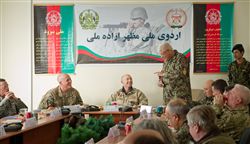I've just returned from a three day visit to Afghanistan.
As always, Afghanistan presents a mixed picture; but I remain cautiously optimistic that we can execute our planned transition to Afghan security responsibility across the country by the end of 2014. We are continuing to build on a successful 2011 from a security perspective.
Naturally, the challenges remain: I received a sobering brief on the depth of corruption in Afghan society, for example. The narcotics challenges -- representing perhaps 15% of the gross domestic product -- are immense. The situation with neighboring Pakistan remains difficult.
Yet overall, in the security sector, I believe we are making progress.
For example, I went to visit the Afghan 201st Corps Headquarters in the eastern part of the country Loghman province. Major General Abdullah, a veteran of fighting in "Soviet times," gave a solid and professional briefing about the work his team is doing around the province. They are continuing to benefit from partnering with a US Task Force, but are very clearly in the lead operationally. Of note is the opening of the crucial routes from historical Jallalabad on the border to Kabul. His troops seem well-equipped and motivated.
I also visited with Provincial Governor Azizi, an urbane and energetic civil leader. He is satisfied with the progress in this largely agrarian region, and seems genuinely convinced that the quality of life is improving. He provided many statistics to support this view, from the thousands of young girls now in school to the fact that every adult seems to have a cell phone, as well as vastly improved medical care and basic services.
After a day in Kabul -- including fascinating discussions with the Russian and Indian Ambassadors to Afghanistan, among many others -- I flew out to the distant west of the country: to Herat. An ancient city, Herat is among the most stable locations in the country. The governor there spoke with deep pride of the girls' school next to his offices, with 4,000 children enrolled. He introduced me to his vibrant prosecutor -- a woman -- who is aggressively attacking corruption. The Italian-Spanish led force in the west has a good plan to continue transferring responsibility fully to the Afghan Security Forces to maintain stability.
In a series of good discussions with our NATO Commanders, I came away with a sense that the transition to Afghan led security is on track.
Today about 50% of the population is under Afghan led security, and 40% of all operations in the country are Afghan led. Afghans participate in over 90% of the total military operations. Coalition forces have made concrete gains on the ground, especially in the south -- Kandahar and Helmand -- where two years ago the Taliban held sway. Today the Afghan national flag flies, children are in government schools, and governance is taking hold. Overall attacks in the country are down about 10% from last year, the first drop in many years.
But as I said earlier, it is a mixed picture. Anybody who says everything is going well is missing the mark. On the other hand, people who say everything is failing simply are refusing to look at the facts.
My personal sense is that we have a reasonable shot at completing a successful transition by the end of 2014, and if the international community continues to support the Afghan government and helps finance the security forces, I believe we can succeed.
Best,
Jim
Admiral, USN
Supreme Allied Commander, Europe
Commander, US European Command
"Stronger Together"



Comments: 1
Admiral thanks for the update. After reading this I feel you seem hesitant we will be successful in our mission, which is understandable and expected. What concerns me is the GDP of 15% is narcotics. How are we addressing this if we cannot control the shipment of drugs across the US Borders?